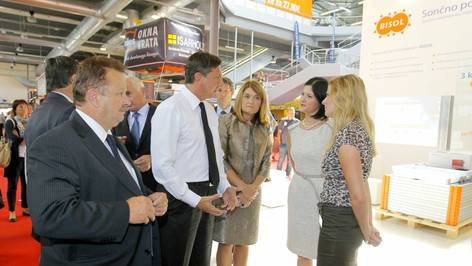NEWS
Prime Minister Pahor opens the 44th International Trade Fair – MOS 2011
The Slovenian prime minister today attended the opening of the 44th International Trade Fair, MOS 2011, and addressed those assembled for the occasion. At the outset, Mr Pahor said that he accepted the criticism, emphasising that certain issues could have been resolved faster and more effectively during the present crisis. He further took the view that, as a result of maintaining its economic stability, Slovenia is not in a bad position. In this context, he reminded the audience that 'Slovenia's economic performance in 2009 was relatively poor, since GDP fell by 10 per cent in one year, and our economy was rapidly collapsing'. As a result of this situation in the Slovenian economy, the Government adopted certain priorities, including the regulation of relations with Croatia. Mr Pahor said that while this priority task was being successfully accomplished, the Government also paid a great deal of attention to the maintenance of social cohesion, equity and security.
'I was right in anticipating that the economic crisis would be protracted in nature. As a result, we adopted measures in order to alleviate its social consequences. We began by taking measures to increase the competitiveness of the economy in mid-2010. However, we encountered stiff resistance from the trade unions and certain stakeholders in the financial market', emphasised Prime Minister Pahor who went on to state that the Government is aware that it has to take its share of responsibility, 'both for what has been done well and for those actions which were not quite up to the challenge'. As for himself, he is fairly optimistic about the challenges that the future holds. In Mr Pahor's view, the main challenge is to remain within the Eurogroup's healthy nucleus. He further pointed out that, should he succeed in completing his term-of-office, this will be his primary task. Moreover, Mr Pahor stated in his address that institutional changes are imperative. 'The people need to clearly articulate what they expect from the government and politics in order to live better, and what they are willing to do themselves in order to achieve this. We are all in the same boat and we will all have to swallow some bitter pills. It is true that we have pulled through the recession, but overcoming the economic crisis will take far more time than one could have ever imagined,' he emphasised. He further explained that the essence of our problems lies in the fact that the majority of Slovenians are dissatisfied with the current situation. However, when proposals for changing this situation are laid on the table, the majority of Slovenians refuse change, and this leads us into a vicious circle,' pointed out Mr Pahor. This dissatisfaction with the current situation can only be overcome with reforms that we have not managed to push through in their entirety. Concluding his address, Prime Minister Pahor explained that 'changes are unavoidable and, for a small country like Slovenia, the status quo in fact means regression'.




